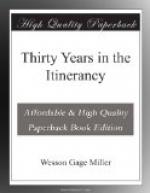At Racine we engaged a man to take us, six in all, with our trunks to Delavan. The roads were almost impassable. The rains had fallen so copiously that the streams overflowed their banks, the marshes were full and the prairies inundated. With a good team, however, we made an average of about fifteen miles a day. Our conveyance stuck fast in the mud eighteen times between Racine and Delavan. Sometimes we found these interesting events would occur just in the middle of a broad marsh. In such case the gentlemen would take to the water, not unfrequently up to the loins, build a chair by the crossing of hands, as they had learned to do in their school days, and give the ladies a safe passage to the prairie beyond. But woe worth the day if the wheels refused to turn, as they sometimes did, in the middle of some deep, broad mud-hole. The light prairie soil, when thoroughly saturated, is capable of very great volatility and yet of stick-to-it-iveness. While the team and wagon, buried deeply in the mud, found the soil as yielding as quicksand, the passengers, on alighting, were no more fortunate. To make the chair and wade ashore with its precious burden, at such a time, involved a very nice adjustment of balances. If the three went headlong before they reached the shore, each received a generous “coat of mail” of the most modern style.
We reached Delavan in due course of travel, where we remained several days. The Sabbath intervened. My father preached in the morning, and I held service in the afternoon. On Monday a council was held. Since our feet touched the soil of Wisconsin, our ears had been filled with the praises of the country, and especially the counties of Dodge and Fond du Lac. By the time we had spent several days at Delavan, and were ready to move on toward Iowa, this clamor had become so decided in its tone, that, as a result of the consultation, it was decided that two or three of us should go up through Dodge and Fond du Lac counties. Not with the expectation that our destination would lie in that direction, but it was thought advisable to know what had been left behind, in case we should not be pleased with Dubuque.
Leaving the balance of our company at Delavan, we started on foot on our tour of exploration. Keeping our eyes and ears open, we were ready to go in any direction in quest of the promised “Eldorado.” Like all “land seekers” of those early times, a few things were deemed essential to make a location desirable. These were prairie, timber and water. But with us one additional requisite must not be ignored. We must also find a “water power.” With all these objects in view, the line of travel became perplexing and described a good many angles, but the main direction lay through East Troy, Summit, Watertown, Oak Grove and Waupun. At the last named place we found a few scattered log houses, and, within a radius of five miles, perhaps a dozen families. The location was beautiful. With its prairie of from one to two miles in width,




